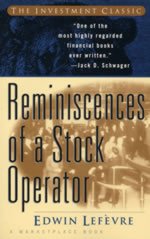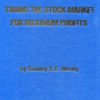REMINISCENCES OF A STOCK OPERATOR
$21.95 Original price was: $21.95.$13.95Current price is: $13.95.
This all-time best-seller captures the attitudes, reactions and feelings common to all traders. Written in 1923, it’s a daily account of Jesse Livermore, one of the greatest speculators ever. You’ll learn more about yourself and your fellow traders from this book than from years in the market.
Out of stock
DESCRIPTION
(From The Foreword – By Jack Schwager) – In my interviews with over thirty of the best traders of our time, there were some questions that I raised in each conversation. One of these was: Are there any books that you found particularly valuable and would recommend to aspiring traders? By far, the most frequent response was “Reminiscenses of a Stock Operator”–a book that was over seventy years old!
What has made Reminiscenses so timeless? I think it is because it accurately captures the mind of a trader–the recollections of mistakes made, the lessons learned, the insights gained. To readers who have trading experiences, the book rings remarkably true. In fact, Reminiscenses vividly portrays the experiences and thoughts of its protagonist, Larry Livingstone–a pseudonym for Jesse Livermore. Many, if not most, people who have read this book believe that Edwin Lefevre is a pseudonym for Livermore.
Lefevre, however, was a real individual. He was a journalist, columnist, novelist, and short-story writer. (Reminiscences actually appeared in serialized form in the Saturday Evening Post before being published in book form.) Although it will be hard for those who read this book to believe, Lefevre was never involved in the markets (beyond a few isolated investments over his lifetime). However, he was a skilled writer who had a remarkable ability to get people to open up. His son recollects that Lefevre would meet people in the course of everyday affairs (clerks, taxi drivers, and so on) and within ten minutes he would know their life story. Lefevre spent several weeks interviewing Livermore–none of this time, incidentally, was spent observing Livermore trade–and Reminiscences was the outcome.
Reminiscences of a Stock Operator is filled with observational gems about the markets and trading. Some of these stories have become such integral elements of Wall Street lore that the original source has been forgotten. For example: “[Prices] are never too high to begin buying or too low to begin selling.” There are so many wonderful lines in this book that it is difficult to select isolated examples. However, I must offer at least one quote to give the bookstore browser a flavor of this volume:
“I did precisely the wrong thing. The cotton showed me a loss and I kept it. The wheat showed me a profit and I sold it out. Of all the speculative blunders there are few greater than trying to average a losing game. Always sell what shows you a loss and keep what shows you a profit.”
Any experienced trader can identify with those lines; inexperienced traders can learn from them. And so it is with numerous sections of this book. Readers who can absorb and follow the lessons spread throughout Reminiscences can significantly improve as traders. Those who can’t will still get a compelling read.
The word classic has, unfortunately, been overused. To my mind, a true classic is a book that because of its unique content or expository style remains widely read and is appreciated for generations, and sometimes even centuries, after its publication. In this sense, Reminiscences of a Stock Operator is a true classic. First published in 1923, it remains one of the most highly regarded financial books ever written.
| publication_year | 1994 |
|---|---|
| product_type | Softcover |
| pages | 299 |
| writer | Edwin Lefevre |
| orig_products_id | 182 |



